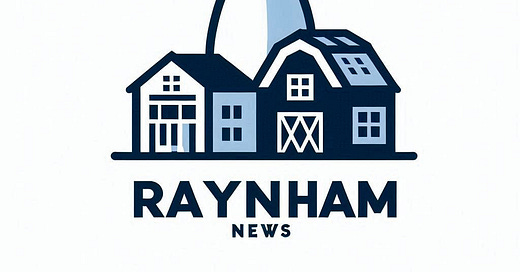Raynham Moves Forward with $3.9M School Budget Override Vote
Town Meeting approves ballot measure to address funding shortfall; school officials cite need to prevent staff cuts and reduce class sizes
RAYNHAM - May 19 - Raynham voters have approved placing a $3.9 million school budget override on the ballot, giving residents the opportunity to decide whether to provide additional funding to the Bridgewater-Raynham Regional School District.
The measure, approved at Monday's Annual Town Meeting, would fund the town’s assessed share of the operating budget for fiscal year 2026 if voters subsequently approve the Proposition 2-1/2 levy limit override at the polls.
Superintendent Ryan Powers told Town Meeting attendees that the district faces significant financial challenges, including rising costs and growing enrollment.
"I realize that obviously our request is a very big request. That is not lost on me," Powers said. "I know it's not lost on members of the school committee or the district."
Powers explained that the district's enrollment has increased by approximately 400 students over the past five years, now totaling 5,682 students. This growth, combined with rising costs for health insurance and special education services, has created financial strain.
"Obviously our expenses are growing faster than our revenue," Powers said. "It's not a unique challenge to Bridgewater-Raynham. It's a challenge we're all facing."
The district's health insurance costs are projected to increase by 15 percent, down from an initial quote of nearly 20 percent. Powers attributed this to high claims costs, which increased by $2.3 million from the previous year.
Special education costs represent another significant expense driver. Powers noted that about 20 percent of the district's students have disabilities, an increase of nearly 4 percent over the last five years. The district is also facing a 25 percent increase in special education transportation costs.
Without the override, Powers warned that the district would need to implement significant layoffs. Approximately 100 non-renewal notices have already been sent out across the district.
"We anticipate being down 40 plus from last year," Powers said. "As you know, we're already down 24 from the year prior. So looking at being down 60 positions across the district, it's just not sustainable."
Rachel King, Bridgewater-Raynham Regional School District School Committee Chair, emphasized that the funding challenges are not unique to their district.
"It is statewide. If you look in the news, all across the state people are going for overrides," King said. "The funding from the state and then locally has not kept up with our cost drivers, which are significantly increasing year-over-year."
The Finance Committee voted not to recommend the article based on financial considerations. Bill Alinucci, Finance Committee Chairman, explained that their primary function is to minimize the burden on taxpayers.
"The Finance Committee has a fiduciary responsibility to minimize the burden on taxpayers on current and future budgets," Alinucci said. "We want to make it clear that it is not a reflection on how we feel about providing the highest quality education to our students."
Several residents spoke in support of the override, including Patrick Chisholm, a senior at Bridgewater-Raynham Regional High School, who expressed concerns about the impact of budget cuts on students.
"Over the last month, I've watched qualified and beloved educators lose their jobs," Chisholm said. "And what's more, those impacted by this layoff are often the youngest and most vulnerable in the district."
Lisa Portini, a resident, emphasized that the vote was simply to allow the question to go to the ballot.
"We're not voting today on whether this passes. We're voting on whether we as a town and we as a district get to decide," Portini said. "So if you're unsure, you should vote yes."
James DuPont, a resident who identified himself as a founding member of Proposition 2 1/2, Citizens for Limited Taxation, also urged voters to put the question on the ballot.
"The sole question here tonight is whether or not the rest of the voters in the town get a chance to vote on it," DuPont said.
If approved by voters at the polls, the override would increase taxes on the average single-family home, assessed at about $590,000, by approximately $637 per year.
The article passed with a vote of 349 in favor and 88 opposed, allowing the question to proceed to a ballot vote.
Town Meeting also approved several other significant measures during the session, including amendments to the general bylaws to rename the Board of Selectmen as the Select Board, and a reduction in the size of the Finance Committee from seven members to five. Additionally, changes to the Capital Planning Committee's dollar threshold for capital requests from $10,000 to $25,000, a 99 year lease of the South School and a zoning change to comply with the state's MBTA Communities Act, designating areas for potential multi-family housing development despite concerns from some residents about potential impacts on town infrastructure and services.
Watch the complete Town Meeting courtesy of the Raynham Channel.
This article was generated through use of artificial intelligence. Please contact us with any concerns regarding accuracy.




